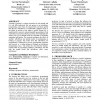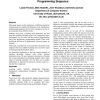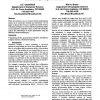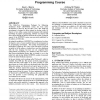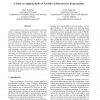42 search results - page 2 / 9 » The effects of pair-programming on performance in an introdu... |
ITICSE
2004
ACM
13 years 10 months ago
2004
ACM
Learning to program is a unique experience for each student, and it is not fully understood why one person in an introductory programming course learns to program better and more ...
SIGCSE
2002
ACM
13 years 5 months ago
2002
ACM
This paper reports on the implication of different preferred learning styles on students'performance in the introductory programming sequence and on work in progress on how t...
SIGCSE
2000
ACM
13 years 9 months ago
2000
ACM
There are numerous ways to evaluate student programming ability, all of which have benefits and drawbacks. In this paper we discuss how we have combined a number of those evaluati...
SIGITE
2004
ACM
13 years 10 months ago
2004
ACM
“The Multi-User Programming Pedagogy for Enhancing Traditional Study” (MUPPETS) system has been under development at RIT for the last three years. This multi-user environment ...
VL
2007
IEEE
13 years 11 months ago
2007
IEEE
Expert programmers possess programming knowledge, which is language independent and abstract. Still, programming is mostly taught only via constructs of a programming language and...
